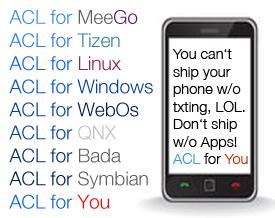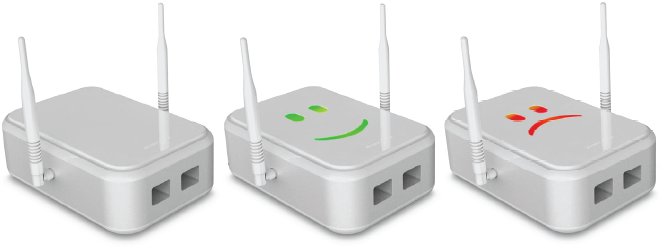Parrot announced a revised version of its Linux-based Parrot AR Drone “quadricopter” flying drone at CES 2012. The drone can now be operated with any Android device such as smartphones and tablets, whereas the previous version could only be controlled by an iPhone or iPad. Another new software features is the auto-pilot. The quadricopter body has been redesigned and reinforced, and fitted with a new 720p HD front-facing navigational camera which can record video and help the pilot navigating the drone. There is also a vertical camera that was present in the first generation. Here are the technical specializations of the Drone’s motherboard: 1 GHz 32-bit ARM Cortex A8 processor (Maybe OMAP3?) 800Mhz video DSP (TMS320DMC64x) 1GB DDR2 RAM USB 2.0 WiFi b/g/n . 3-axis accelerometer 3-axis gyroscope 3-axis magnetometer Pressure sensor for altitude measurement (altitude > 6m) Ultrasound sensor for ground altitude measurement (lower altitude) 60fps vertical QVGA camera […]
2012 Linux and Android Events by the Linux Foundation
The Linux Foundation has announced the list of events it organizes for 2012. Those are mainly technical, but there is also one event dealing with legal issues. Most of the venues are in the US, with 2 back-to-back events in Europe (Barcelona) and 1 in Asia (Japan). If you are one of the first 50 to register for any LinuxCon event, you can get a 35% discount, by registering with the code “12PM35”. List of Events: Android Builders Summit – February 13-14, 2012, Hotel Sofitel SF Bay, Redwood Shores, Calif. A technical summit for OEMs, their device manufacturers, integrators, custom builders, and the growing Android and Linux Kernel developer communities. Embedded Linux Conference – February 15-17, 2012, Hotel Sofitel SF Bay, Redwood Shores, Calif. The premier vendor-neutral technical conference for companies and developers using Linux in embedded products. Linux Storage, Filesystems and MM Summit – April 1-2, 2012, Hotel Nikko, […]
Develop Android Apps, Deploy on Meego, Tizen, WebOS, Ubuntu and More
OpenMobile World Wide Inc. is demonstrating its Application Compatibility Layer (ACL) technology, capable of running Android apps on non-Android devices at CES 2012 in Las Vegas. The company claims that their solution brings more than 300,000 Android apps to device running on other platforms. The technology allows OEMs of Tablets, Set Top Boxes, smart TVs, Netbooks, In-Vehicle Infotainment devices and more to provide users access to a all Android applications. OpenWorld ACL technology currently works on tablets, STBs and netbooks based on MeeGo, WebOS and Ubuntu. The company also plans to make the technology available for Tizen, Windows, Bada, QNX, Symbian and more. The company claims 100% compatibility for Android apps including those developed using the Android Native Development Kit (NDK). The ACL layer is said not to drain the device resources at all. Device power and memory will be unchanged. Here are the Key Benefits of ACL according to […]
Marvell SMILE Plug Enables Education 3.0
Marvell worked in collaboration with Stanford University to design the Marvell SMILE Plug, a development kit designed to turn a traditional classroom into an interactive learning environment. Designed to engage students (via their smartphones / tablets) in critical reasoning and problem solving, the SMILE Plug creates a “micro cloud” within a classroom that is controlled by the teacher. The Plug based on Stanford’s Mobile Inquiry Based Learning Environment (SMILE) – hence the name – provides the ability to establish a local Wi-Fi network for up to 60 students. To simplify deployment and management of the SMILE Plug, Marvell has developed a plug administration API and user interface called Plugmin. Key Features of the SMILE Plug: Wi-Fi support for 60 clients Easy deployment and management 5V Lithium Ion Backup battery Open Platform: Arch Linux for ARM and NODE.js SMILE Junction Server: Plug server/client environment & SDK and access to SMILE applications […]
20 Times More Graphics Performance with Imagination G6200 and G6400 PowerVR Series 6 GPU
Imagination Technologies announced the first two IP cores, namely PowerVR G6200 and G6400 GPU IP cores, part of PowerVR Series6 GPU cores. PowerVR Series6 relies on PowerVR Rogue architecture based on a scalable number of compute clusters and designed to target the requirements of new high-end graphics applications for smartphones, tablets, PC, console, automotive, DTV and more. The G6200 and G6400 have 2 and 4 compute clusters respectively. The company claims that PowerVR Series6 GPUs can deliver 20x or more of the performance of current generation GPU cores targeting comparable markets thanks to the new Rogue architecture that is around 5x more efficient than previous generations. The PowerVR Series6 GPU cores offer computing performance exceeding 100GFLOPS (gigaFLOPS) and reaching the TFLOPS (teraFLOPS) range. The PowerVR Series6 family introduces new technologies and features such as: An advanced scalable compute cluster architecture. High efficiency compression technology including lossless image and parameter compression […]
Google TV at CES 2012
Google TV was not very successful in 2011 to say the least, Google decided to cancel Google TV appearance in some tradeshows and the Logitech Revue is now phased out, but may come back with a vengeance in 2012 as many companies showcase Google TV based solutions and products at CES 2012. I will mainly talk about the devices and hardware platforms in this post, if you want to know what’s new in Google TV 2.0 checkout “Google TV 2.0 For Android 3.1 Released“. Google TV Reference Design Last week, Marvell announced it would offer the official Google TV Reference Design based on its Armada 1500 (Dual Core ARMv6/7 CPU + GC1000 GPU) “Foresight Platform” replacing Intel CE4100 used with the previous version of Google TV. If you have not seen it yet in my previous post “Marvell Armada 1500 Google TV at CES 2012“, you can watch the video […]
Vuforia: Qualcomm Augmented Reality Platform
Qualcomm named its Augmented Reality Platform “VuForia” at CES 2012. I was a bit confused reading the press release and thought it was a new product. Actually, it is the augmented reality platform whose Beta SDK has been released in December 2011. Qualcomm explains that “Vuforia’s computer vision functionality will recognize a variety of 2D and 3D visual targets. With support for iOS, Android, and Unity 3D, Vuforia will allow you to write a single native app that can reach over 400 models of smartphones and tablets.” To showcase the AR platform, Qualcomm and Sesame Workshop, the producer behind Sesame Street, have joined forces to explore augmented reality experiences for children and created a prototype playset that brings physical toys to life.
Asus Unveils 249 USD Nvidia Tegra 3 Android 4.0 Tablet
During Asus Keynote at CES 2012, the company showed the Eee Pad MeMo 7 (ME370T) featuring a Nvidia Tegra 3 Quad-core processor running Android ICS with 1GB of RAM, 16GB to 32GB of storage, WiFi, Bluetooth, aGPS, a SIM card slot, micro-HDMI output and up to 8.5 hours of battery life. As you can see in the picture above, the good news is that the Tablet would be available for 249 USD in Q2 2012 according to reports in several websites. I could not find Asus official press release. In another blog, I found that Nvidia also announced DirectTouch technology that uses the Nvidia Tegra 3 companion core to sample touch on the device more frequently (about three times more often) resulting in a more responsive UI.











